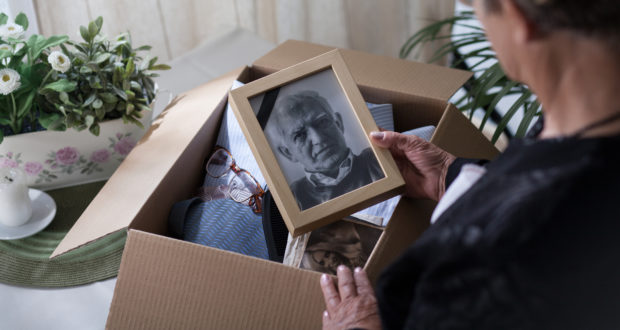When Angie Wraight’s husband of 38 years died in her arms during the pandemic last year, she felt lost.
A “wonderful” palliative care team had helped keep her husband Brian comfortable through his cancer battle, but when the rush of nurses and doctors stopped after his death, the silence seemed deafening.
“I was lost, absolutely lost,” Wraight said.
“He died in our lounge room. I couldn’t go into the lounge room, I couldn’t go into our bedroom, I couldn’t cook in the kitchen, I was just struggling with everything.”
The pandemic meant Wraight could not be beside her husband during his cancer treatments and her grief was compounded after his death when in-person visits were banned during Melbourne’s lockdown.
Agreeing to join a grief counselling group run by the Palliative Care South East helped her through some dark times.
“The group was immense in getting me through what I needed to and getting me through everything that was so hard during a pandemic as well,” she said.
“It’s one of those things your friends really can’t talk to you about — they just don’t know what to say, whereas the counsellors can get the right information across to you, so you can open up and not be angry or destructive to yourself.
“If I hadn’t have had that group … I think my son would have been with a casket with me as well as having to bury his dad.
“It was absolutely critical — they really did save me.”
Wraight said the counselling taught her to deal constructively with her loss alongside others experiencing the same thing.
One year on from losing her husband in November last year, the “rollercoaster” of emotions still happens but she is learning to slowly handle it.
“When you’re really flat and you’ve got nowhere to turn and you’ve just got that black hole, they’ve given me things to get myself out of it, so I can think there’s a positive light coming through and it will get better.”
The unprecedented impact of Covid has meant feelings of grief and loss are often compounded, because people are unable to follow their usual traditions around death and dying.
Palliative Care Australia warned in a paper in December that insufficient support after the death of a loved one could cause negative impacts on wellbeing, physical health, mental health and financial security.
In normal times, about 10 per cent of bereaved people are at high risk of complex grief issues but this is predicted to rise to 20 per cent post-Covid, with greater demand expected for grief and bereavement services, the organisation said.
Non-profit Palliative Care South East experienced a surge in the need for bereavement counselling over the pandemic.
Demand jumped 30 per cent last year and a further 30 per cent this year, chief executive Kelly Rogerson said.
“The services have all experienced a significant uplift in demand and we expect it will continue,” Rogerson said.
“We used to on average support one or two people in a family but we’re seeing whole families that are needing support rather than single individuals in a family.”
Rogerson said more people were presenting with “complicated grief” caused by the lack of usual social networks during lockdown.
“Funeral processes and coming together, and celebrating the life of someone haven’t been able to be had, and people are experiencing significant amounts of guilt and sadness, and grief,” she said.
“What we’re seeing at the moment is people experiencing the anniversary from last year reaching out to us, 12 months on from the funeral or anniversary of their loved one since last year’s lockdown.
“We’re expecting that all to continue on to next year at the very least.
“Grief’s a really normal emotion: the problem is when it takes over your life and you can’t do anything else — obviously you need a bit of help and support to get through that.”
At the same time demand is expected to increase, the service’s lease on its current building will expire in September.
A new facility is being built in Melbourne’s outer east but another $2m is needed to provide counselling rooms.
Rogerson says the service otherwise won’t be able to meet demand for bereavement support, potentially placing more burden on the mental health system.
“We won’t be able to meet the demand and people are going to go without — that’s my biggest concern,” she said.
“They’ll end up in the mental health system, putting a further burden on what we already know are services significantly under pressure.
“If we can help support people in the community and keep them out of needing seeing psychiatrists and psychologists by providing them grief counselling, it’s preventive health without requiring hospital admissions and further ongoing care.”
The state government has been contacted for comment.
Do you have an idea for a story?Email [email protected]
 Aged Care Insite Australia's number one aged care news source
Aged Care Insite Australia's number one aged care news source

